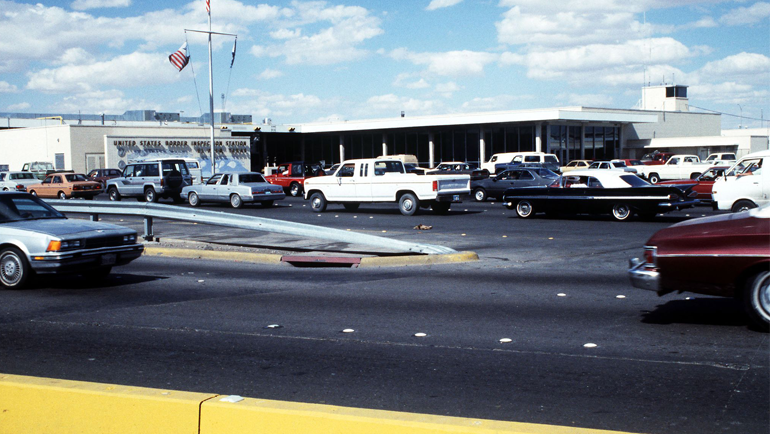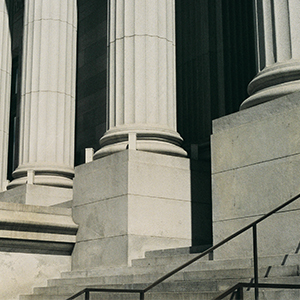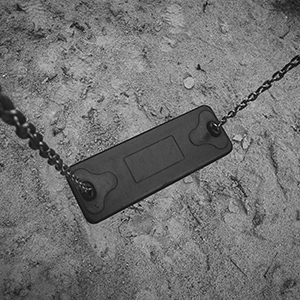Menu
Hot-Topics
February 19, 2026 | SCOTUS Reaffirms Fourth Amendment Standard for Police Responding to Household Emergencies
Category: Supreme Court Decisions
Jones v Van Zandt: Supreme Court Tackles Constitutionality of Slavery
Jones v Van Zandt, 46 U.S. 215 (1847) is one of the U.S. Supreme Court cases that considers slavery issues before the Civil War. The justices ultimately ruled against abolitionists, holding that the Fugitive Slave Law was a valid exercise of the auth...

Supreme Court to Consider Immunity for Cross-Border Shooting in Hernandez v Mesa
On October 11, 2016, the Supreme Court added several high profile cases to its docket. One of the most-anticipated cases is Hernandez v Mesa, which involves the fatal shooting of a Mexican teenager by United States Border Patrol from across the U.S. ...
Swift v Tyson Authorizes Federal Courts to Create Federal “Common” Law
In Swift v Tyson, 41 U.S. 1 (1842), the U.S. Supreme Court held that the federal courts were authorized to create their own body of common law when hearing cases based on diversity jurisdiction and were not bound by the decisions of the state courts ...

Pena-Rodriguez v Colorado: US Supreme Court Takes on Racism in the Courtroom
Racism is a hot button issue in the United States right now, and the U.S. Supreme Court is right in the middle of it. The justices recently heard oral arguments in Pena-Rodriguez v Colorado (no.15-606, 2016); in which the Court will be forced to weig...

SCOTUS to Consider Ban on Disparaging Trademarks in Lee v Tam
On September 29, 2016, the U.S. Supreme Court added nine cases to its docket. Lee v Tam, which challenges the federal ban on disparaging trademarks, has the potential to be a blockbuster. The Court’s decision could also have serious implications fo...

Worcester v Georgia: Indian Sovereignty and the States
In Worcester v Georgia, 31 U.S. 515 (1832), the U.S. Supreme Court held that the Cherokee Nation was sovereign. It also ruled that the federal government — and not the states — was authorized under the Constitution to deal with Indian nations. ...

New Supreme Court Term Kicks Off with Oral Arguments in Five Cases
The U.S. Supreme Court’s new term gets into full swing next week. To kick off the new Supreme Court term, the justices will hear oral arguments in five cases, along with issuing orders and a meeting to consider additional cert petitions. ...

Cherokee Nation v Georgia: The Rights of Indian “Nations”
In Cherokee Nation v Georgia, 30 U.S. (5 Peters) 1 (1831), members of the Cherokee Nation sought to enjoin the state of Georgia from seizing their land. However, the U.S. Supreme Court held that it lacked the authority to enforce the rights of Native...

Craig v Missouri Interprets Prohibition of Bills of Credit Under Article I
In Craig v Missouri, 29 U.S. 410 (1830), the U.S. Supreme Court held that a Missouri statute authorizing loan certificates issued by the state violated Article I, section 10 of the Constitution, which prohibits states from issuing bills of credit. ...

SCOTUS to Consider Trinity Lutheran Church v Pauley—Public Funding for Religion
The U.S. Supreme Court recently agreed to consider Trinity Lutheran Church v Pauley, a case involving whether the state of Missouri violated the Constitution when it denied the Trinity Lutheran Church’s application for Missouri’s Scrap Tire Grant...
Previous Articles
SCOTUS Decision in Bowe v. United States Is First of the 2026 Term
by DONALD SCARINCI on February 5, 2026
In Bowe v. United States, 607 U.S. ___ (2026), the U.S. Supreme Court held that Title 28 U.S.C. § ...
SCOTUS Rules State Can’t Immunize Parties from Federal Civil Liability
by DONALD SCARINCI on January 29, 2026
In John Doe v. Dynamic Physical Therapy, LLC, 607 U.S. ____ (2025) the U.S. Supreme Court held that...
Supreme Court to Address Racial Discrimination in Jury Selection
by DONALD SCARINCI onWhile the U.S. Supreme Court has concluded oral arguments for the year, it continues to add cases t...
The Amendments
-
Amendment1
- Establishment ClauseFree Exercise Clause
- Freedom of Speech
- Freedoms of Press
- Freedom of Assembly, and Petitition
-
Amendment2
- The Right to Bear Arms
-
Amendment4
- Unreasonable Searches and Seizures
-
Amendment5
- Due Process
- Eminent Domain
- Rights of Criminal Defendants
Preamble to the Bill of Rights
Congress of the United States begun and held at the City of New-York, on Wednesday the fourth of March, one thousand seven hundred and eighty nine.
THE Conventions of a number of the States, having at the time of their adopting the Constitution, expressed a desire, in order to prevent misconstruction or abuse of its powers, that further declaratory and restrictive clauses should be added: And as extending the ground of public confidence in the Government, will best ensure the beneficent ends of its institution.
Awards





